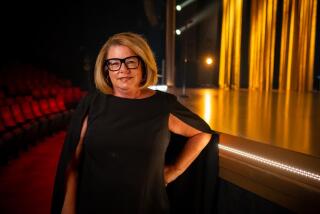Rose Marie: An unnaturally talented natural performer for life
To have experienced the whole of Rose Marie’s career firsthand, one would have had to be as old as Rose Marie — 94 when she died on Thursday, already back in the public eye as the subject of the recent biographical documentary “Wait for Your Laugh.” She was just 3 years old when she took to the stage, a small child with a big voice, setting out on a path that wound through radio and records, nightclubs, Broadway, movies and television, and finally into the world of social media as a late-adopting nonagenarian Twitter tweeter.
Her television credits begin more or less with the birth of the medium and continue into the present decade, with voice-overs for “The Garfield Show.” For a certain generation, she is the woman sitting above Paul Lynde on “Hollywood Squares,” of which she was a charter and longtime panelist.
But she is most strongly identified with “The Dick Van Dyke Show,” on which she played comedy writer Sally Rogers for five seasons. (One might easily say that she imported this role into “Hollywood Squares,” a show business veteran cracking wise.) Arguably, with 3½ decades of work already behind her, she was the best known of the “Van Dyke” cast, including its star, at the time of its premiere in 1961. (In fact, she’d spent the previous year on another CBS sitcom, the single-season “My Sister Eileen” with Elaine Stritch.) She was the second to be hired, and second-billed, and was offered the part without having to audition.

That Sally Rogers was a woman working as an equal alongside men — Van Dyke’s Rob Petrie and Morey Amsterdam’s Buddy Sorrell — was taken within the context of the series as unremarkable, though in the world beyond it made her a role model. This was, in its small way, revolutionary.
Less revolutionary, even something of a cliché, was Sally’s unsatisfactory singleness, a convenient hook for comedy, and at times for pathos — both of which Rose Marie handled deftly. (She does some lovely acting in “The Dick Van Dyke Show.”) It was vaguely suggested that Sally may have been too much one of the boys to be one of the girls. (“It was like watching a man cry,” Buddy says in one episode, after seeing Sally in tears.)
And yet though moral customs of the time meant that Sally didn’t really have a “past,” or a sexual present, we understand watching her that she was not what one would call a spinster. Indeed, Rose Marie had been married to trumpeter Bobby Guy since she was 23. (She became a widowed single mother late in the show’s run.) If you first encountered the actress as Sally, you understood that the character, and the person who played her, had lived some life.
Indeed, what you can miss in both the performer and the part, given the lovelorn role the show assigned them, is the glamour — it’s there onscreen, to be sure, if you look past the workplace comedy and the insult banter, often directed at Sally’s presumed unattractiveness.
But it was a practice of the series to let its cast “do their acts” now and again; occasion was found to let her sing, and in these moments — you can find them online easily, numbers like “I Want to Be Around,” “Santa Send a Fella” and “I Want to Sing Like Durante” — you get a full helping of Rose Marie. She’s lithe and agile, light on her feet, full of energy. (She was only 38 when “The Dick Van Dyke Show” debuted.)

You get a glimpse of the nightclub singer she became after child stardom ran its course: the woman who opened the Flamingo Hotel and gave proprietor Bugsy Siegel grief over $11 missing from her paycheck; the woman who publicly rejected the advances of a producer and found her musical numbers cut from “Top Banana,” the 1954 film of the 1951 Broadway show in which she appeared with Phil Silvers.
What set her apart? Young and old, she presented an uncanny overlay of past and future selves, as if she’d lived her life backwards and forwards at once.
As a moppet flapper with a Louise Brooks bob, singing “Sentimental Gentleman from Georgia” or “My Blue Bird’s Singing the Blues” in the voice of a gin-mill chanteuse three times her age, she projected a premature maturity kept from freakishness by the fact that she is always clearly a kid having fun, raucous and carefree. As an experienced older woman, she maintained a cheeky girlishness, accentuated by but not dependent on the big hair bow she wore as a trademark from “Dick Van Dyke” onward.
In neither case did this seem studied or affected. She was ever simply, genuinely Rose Marie, first to last, a natural.
WATCH: Video Q&A’s from this season’s hottest contenders »
ALSO
Rose Marie, co-star of ‘The Dick Van Dyke Show,’ dies at 94
Rose Marie and her 90 years in show biz are saluted in documentary ‘Wait for Your Laugh’
More to Read
The complete guide to home viewing
Get Screen Gab for everything about the TV shows and streaming movies everyone’s talking about.
You may occasionally receive promotional content from the Los Angeles Times.







